Library
All resources
1721 – 1740 of 2421 results

Market Analysis Application in WASH Response
Report
Markets are an important aspect of the livelihood where the majority of the world’s population depend upon. During disaster, market recovery is critical where it indicates the recuperation that livelihood, jobs and businesses rely upon. Humanitarian actors need to factor market analysis into their...
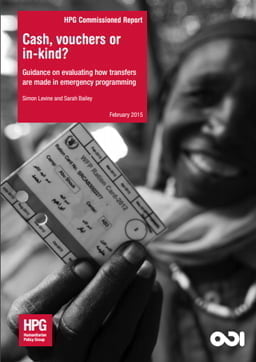
Cash, Vouchers or In-Kind? Guidance on Evaluating How Transfers are Made in Emergency Programming
Guidelines and Tools
In humanitarian settings, aid agencies often assist populations by transferring resources, usually using cash, vouchers or in-kind aid, such as food rations, shelter materials, seeds and tools and kits of household items. The use of cash or vouchers to replace in-kind aid is most pronounced in food...

State of the Use of Mobile Technologies for Disaster Preparedness in South East Asia
Report
This report summarizes the study conducted by Nanyang Technology University (NTU) in collaboration with the Global Disaster Preparedness Center with support from the USAID-Office of Foreign Disaster Assistance to better understand how new communication and information sharing technologies can enhance risk...
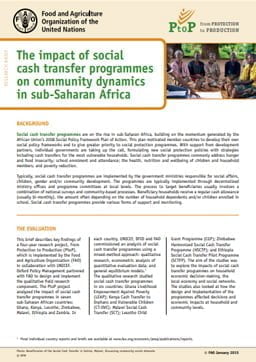
The Impact of Social Cash Transfer Programmes on Community Dynamics in Sub-Saharan Africa
Report
Social cash transfer programmes are on the rise in sub-Saharan Africa, building on the momentum generated by the African Union’s 2008 Social Policy Framework Plan of Action. This plan motivated member countries to develop their own social policy frameworks and to give greater priority to social...
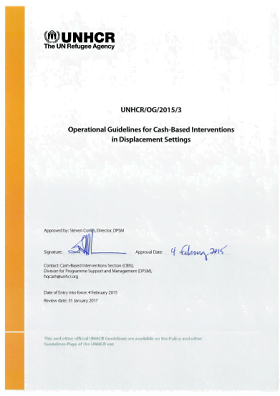
Operational Guidelines for Cash-Based Interventions in Displacement Settings
Guidelines and Tools
These operational guidelines support UNHCR and partner staff to determine if and when cash-based interventions (CBIs) are appropriate to meet the needs of refugees and other persons of concern and aids the design and implementation of effective programmes. It focuses on the needs of refugees, but can...
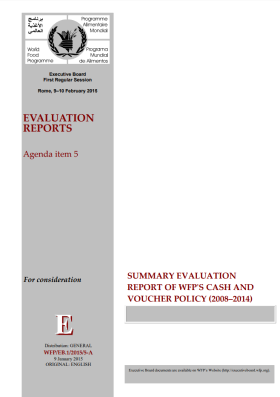
Summary Evaluation Report of WFP’s Cash and Voucher Policy (2008-2014)
Report
The WFP’s Summary Evaluation Report on cash and voucher policy (2008-2014) was commissioned by WFP’s Office of Evaluation in order to assess the quality and results of the policy and its implementation. The evaluation found that although the policy does not represent WFP’s current best...

Evaluation of the OneCard Pilot in Lebanon
Report
The OneCard pilot is part of the WFP-UNHCR Joint Plan of Action for Cash and Vouchers (2014), which aims to implement cash and vouchers using common e-delivery mechanisms. The objectives of the OneCard pilot were: To test the programmatic, technical, and financial efficiency and feasibility of the...

Part 1.2 The Minimum Expenditure Basket
Report
The Minimum Expenditure Basket (MEB) is defined as what a household requires in order to meet basic needs – on a regular or seasonal basis – and its average cost. Determining the MEB serves three functions: a) it is a holistic reflection of need as perceived by crisis affected populations, including...

Workshop Report – Cash Transfer Programming (CTP) in Northern Syria: Where are we now and where do we want to be?
Report
This report summarizes the outcomes of a one day workshop on Cash Transfer Programming (CTP) that was organized by the Cash-Based Responses Technical Working Group (CBR-TWG) for Northern Syria on April 28th 2015 in Gaziantep, Turkey. The workshop was attended by a wide group of stakeholders from the...
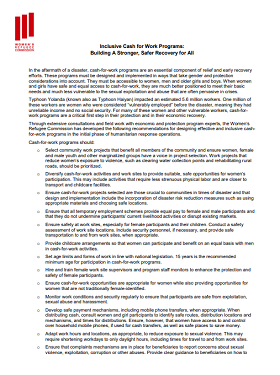
Inclusive Cash for Work Programs: Building A Stronger, Safer Recovery for All
Report
In the aftermath of a disaster, cash-for-work programs are an essential component of relief and early recovery efforts. These programs must be designed and implemented in ways that take gender and protection considerations into account. They must be accessible to women, men and older girls and boys. When...

Liberia Ebola Response
Presentation
ICRCs EVD Cash response program had to be designed under a rare circumstance of insufficient baseline data on EVD impact on household level and limited opportunity to contact intended beneficiaries for a detailed assessment/ proper situational analysis.

Review of Targeting of Cash and Food Assistance for Syrian Refugees in Lebanon, Jordan and Egypt
Report
This report is an output of a consultancy to review the process of developing protocols for targeting cash and food assistance to Syrian refugees in Lebanon, Egypt and Jordan during 2014. Under the auspices of the High Level Meeting between WFP and UNHCR (May 2014) and the WFP and UNHCR Joint Action...
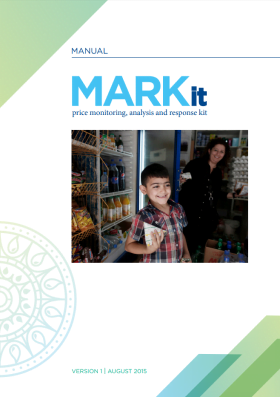
MARKit: Price monitoring, analysis and response kit
Guidelines and Tools
The Price Monitoring, Analysis and Response Kit (MARKit) was developed by representatives from the Local Regional Procurement (LRP) Learning Alliance to guide food assistance practitioners through the steps to monitor markets during the implementation of food assistance programs, and to ensure that...
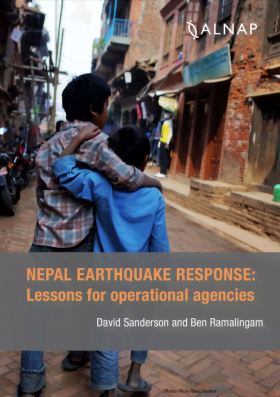
Nepal Earthquake Response: Lessons for operational agencies
Policy paper
In the aftermath of the April 2015 earthquake in Nepal, this paper looks at lessons drawn from previous comparable disasters and seeks to provide invaluable information and assistance to the operational agencies responding to the crisis. Seventeen Lessons give an overview of important learnings based on...
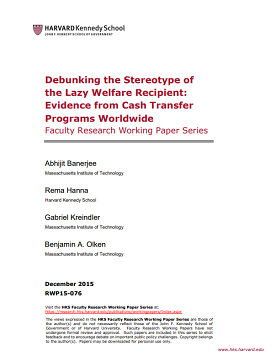
Debunking the Stereotype of the Lazy Welfare Recipient: Evidence from Cash Transfer Programs Worldwide
Report
Targeted transfer programs for poor citizens have become increasingly common in the developing world. Yet, a common concern among policy makers – both in developing as well as developed countries – is that such programs tend to discourage work. We re-analyze the data from 7 randomized controlled...
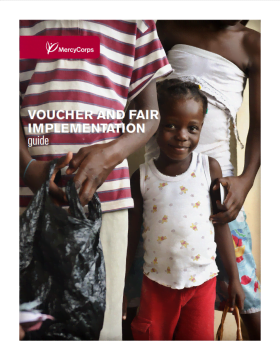
Voucher and Fair Implementation Guide
Guidelines and Tools
Mercy Corps’ Voucher and Fair implementation Guide provides clear, step-by-step guidelines for teams implementing cash, restricted cash, or commodity voucher programmes. Written for an internal audience, the Guide may also be useful for peer agencies.

Know Your Customer Standards and Privacy Recommendations for Cash Transfers
Guidelines and Tools
This report reviews how Know Your Customer (KYC) standards – rules designed to combat criminal money laundering and terrorism financing – are applied in humanitarian cash programs. The report examines the practices of aid agencies and their processing of the personal information of...

Pre-crisis Market Mapping and Analysis (PCMMA): Training Report
Report
In recent years, humanitarian organisations have been re-examining their
responses to emergencies. Many have begun experimenting with cash-based initiatives alongside or in place of conventional relief distributions of food and non-food items, and local procurement is being encouraged wherever possible....

The CALP Network At A Glance
Guidelines and Tools
The CALP Network is a global partnership of humanitarian actors engaged in policy, practice and research within cash transfer programming (CTP). Formed of a community of practice including over 150 organisations and more than 5,000 individuals in the humanitarian sector, the CALP Network is based on...

Research on Food Assistance for Nutritional Impact (REFANI): Literature review
Report
The REFANI literature review identifies existing evidence on the use of Cash Transfer Programmes (CTPs) and the impact of CTPs on acute malnutrition in humanitarian contexts. The review is structured as follows: Section A discusses the global burden of acute malnutrition; Section B highlights...